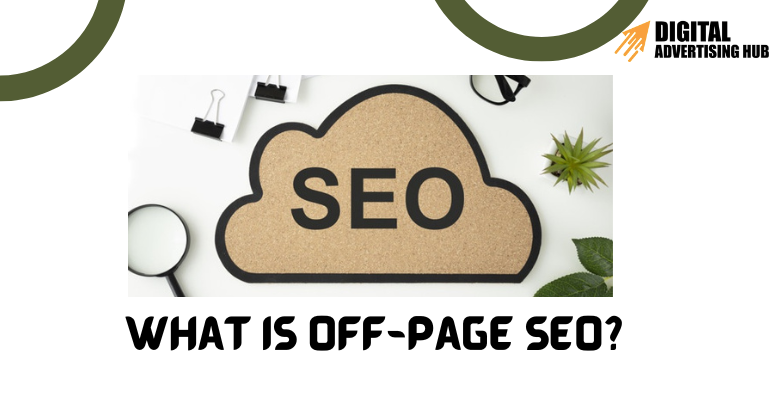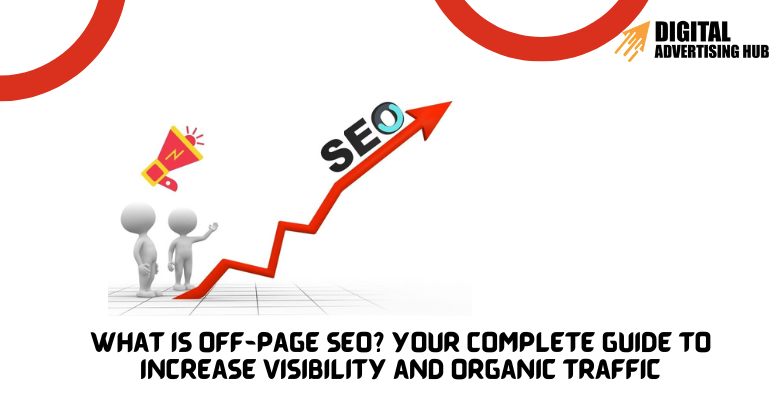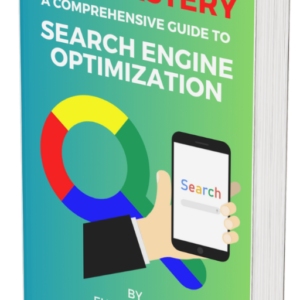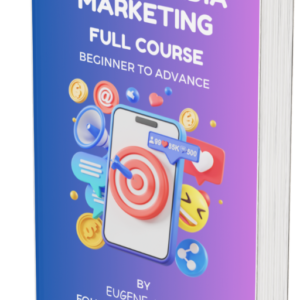Consider this: A prospective client is actively looking for your goods or services on the internet. They expect to obtain relevant results when they put their query into a search engine. But your website is never seen since it is buried deep in the search results. This is a typical scenario for companies who have disregarded SEO’s significance.
Today, having a strong internet presence is essential to running a successful business, not a luxury. The deliberate process of improving your website to increase its exposure and ranking in search engine results pages is known as SEO, or search engine optimization. You can generate a consistent flow of qualified leads and propel your company’s growth by putting SEO strategies into practice.
Gaining control over off-page SEO techniques like social media optimization, backlink development, and local online presence optimization will greatly increase the exposure and authority of your website. To guarantee that your website stays competitive and draws in a consistent flow of quality leads, stay up to date on the most recent SEO trends and best practices.
Are you prepared to learn effective techniques that may improve the exposure of your website and increase natural traffic? To assist you in reaching your marketing objectives, I have chosen to outline the most important off-page SEO strategies, resources, and best practices in this comprehensive blog post.
What is Off-Page SEO?

The term “off-page SEO” describes the methods and approaches you employ to raise your website’s search engine rankings by concentrating on outside elements that aren’t directly related to it. It entails establishing credibility and relationships outside of your website through social media marketing, local SEO initiatives, and backlink acquisition.
On-page SEO entails improving the technical, structural, and content elements of websites. Examples include meta tags, picture alt text, website performance, and keyword optimization. Read the best On-page SEO techniques here.
Conversely, off-page SEO describes the establishment of credibility and relationships away from your website. Backlinks, social media promotion, local SEO, and brand mentions are a few examples.
While off-page SEO is very important for building your website’s reputation and credibility, on-page SEO is also quite important for attaining top search engine ranks.
Why is Off-page SEO Important?
Off-page SEO has several advantages that can greatly affect the performance of your website. Let’s take a closer look at a few of these benefits:
#1. Higher Search Engine Positions
Improved exposure: Your website’s search engine rankings can be raised by high-quality backlinks and favorable internet mentions, which will increase its visibility to prospective buyers.
Increased organic traffic can result in conversions and sales. This is because higher rankings attract more organic visitors. In addition, having a better ranking than your competitors might offer you a sizable competitive advantage.
#2. Increased Website Authority
Developing connections and being an authority in your field will help your website become more credible and reliable.
Users are more inclined to believe your suggestions and material when they view your website as a reliable source.
The impression and image of your brand might be enhanced by having a solid internet reputation.
#3. Greater Awareness of the Brand
You can raise the internet exposure and awareness of your business by engaging in off-page SEO initiatives. Your brand gains recognition when it is regularly cited in credible publications.
Also, you can position your business as a leader in your field with a strong web presence.
#4. Better User Experience
You can tangentially enhance your website visitors’ user experiences by concentrating on developing excellent connections and producing useful material. Consumers are more inclined to interact with your brand when they find your content to be educational and useful. Enhanced customer satisfaction and positive reviews can result from a positive user experience.
#5. Increased Online Visibility
By using off-page SEO, you can increase your online visibility and connect with more people outside of the domain of your website. Off-page SEO can assist local businesses in reaching clients inside their desired geographic region.
Off-page SEO may occasionally even assist you in gaining worldwide recognition.
#6. Higher Conversion Rates
Off-page SEO can drive targeted traffic to your website, which raises the possibility that users will convert. A solid internet reputation may increase conversion rates by fostering a sense of trust among prospective buyers. Learn about 20 Most Innovative Insider Tips for Growing Your Website Traffic.
A good user experience can persuade visitors to carry out desired activities, such buying something or subscribing to a newsletter.
#7. Enhanced Customer Loyalty
Among your target demographic, a good web presence can boost brand awareness and loyalty. Recurring business and consumer loyalty may be generated by consistently having positive experiences.
Your brand is more likely to be supported and recommended to others by devoted customers.
#8. Sustainability over the Long Term
Your website can expand naturally using off-page SEO, reducing the need for expensive advertising.
You can make sure that your website is successful in the ever-changing digital world by concentrating on off-page SEO.
What Are the Best Off-Page SEO Techniques?

A range of techniques are used in off-page SEO to increase the authority and exposure of your website in search engine results. The following are a some of the best off-page SEO strategies:
#1. Backlinks
Links pointing from other websites to your website are known as backlinks. Backlinks are seen by search engines as endorsements, demonstrating the importance and pertinence of your website.
How to obtain backlinks of superior quality:
–Guest blog entry: Include connections to your website in guest articles you write for other websites in your niche.
–Damaged connection development: Find broken links on other websites and propose to add connections to your pertinent material in their stead.
-Link reclamation: Get backlinks to your website by getting in touch with sites that once connected to it.
-Submissions to directories: Send links to your website to pertinent internet directories.
-Social media sharing: Post links to your material on social media sites to entice other people to do the same.
#2. Social Media Marketing
Make use of social media platforms: Establish accounts on well-known social media sites such as Instagram, LinkedIn, Facebook, and Twitter.
Share informative and interesting information with your audience on a regular basis.
React to messages and comments from your followers to foster interaction. To make it simple for users to share your material, including social media sharing icons on your website.
#3. Local Search Engine Optimization:
Enhance your Google My Business entry: In order to give correct information about your business, claim and improve your Google My Business listing.
Make sure that the information about your company appears consistently on citation websites and internet directories. Ask pleased clients to provide gratifying evaluations on Google and other review sites.
#4. Brand references:
Make use of tools to keep tabs on internet references of your brand. Show that you are concerned about your internet reputation by replying to remarks, whether they are favorable or unfavorable.
Get in touch with the source and ask them to add a link to your website if they haven’t already.
#5. Influencer Marketing
Find influential people in your field who are relevant with a sizable, devoted fan base.
Join together with influencers to market your goods or services or to produce sponsored content.
Keep tabs on the outcomes of your influencer marketing initiatives to gauge their success.
#6. Forum Marketing:
Look for internet discussion boards pertaining to your sector or specialty. Participate in conversations and provide insightful commentary. Make relationships with other forum participants. Organically include links to your website in your answers where applicable.
#7. Article Submissions
Look for websites that allow guest pieces from professionals in your field. Send these publications well-written, educational pieces. Throughout the piece, provide a link to your website. You can become an expert in your industry by making contributions to credible publications over time.
#8. Video Marketing
Make excellent videos: Make films that are educational, interesting, and pertinent to your target market. Incorporate pertinent keywords into the tags, descriptions, and titles of your videos.
Including videos on your website may boost search engine rankings and enhance user engagement. To reach a larger audience, advertise your films on social media sites.
#9. Podcast Guest Appearances:
Look for podcasts with a devoted following within your sector. Offer your knowledge on a pertinent subject. Post about your podcast appearance on social media and your website. Request that the host link to your website in the podcast description or mention it.
#10. Email Outreach:
Determine which websites to target: Look for websites related to your target market inside your sector.
Send an introduction along with a link to your website to the editors or website owners. Make an offer to work together on guest posts, material, or link exchanges.
To keep the relationship going, follow up on your initial effort.
#11. Event Marketing:
Participate at conferences, trade exhibits, and networking events; Attend industry events. Network with other industry experts: Establish connections with possible clients, influencers, and collaborators.
Give out promotional materials or bring up your website in talks. Get the participants’ contact details so you may follow up.
You can raise the exposure, authority, and general online success of your website by putting these off-page SEO strategies into practice.
Always remember that prioritizing quality over quantity is the secret to effective off-page SEO. Few high-quality backlinks from reliable websites are preferable than a large number of low-quality backlinks.
What Are the Best Tools for Off-Page SEO?
You will want a collection of potent tools in order to execute off-page SEO methods successfully. The following are a some of the most crucial off-page SEO tools:
#1. Tools for Analyzing Backlinks:
- Ahrefs: A thorough backlink analysis tool that offers detailed data on the backlinks pointing to your website as well as those of your rivals.
- Moz: Provides a selection of SEO tools, such as the ability to do keyword research and evaluate backlinks.
- SEMrush: A well-known SEO tool with tools for competition analysis, keyword research, and backlink analysis.
#2. Tools for Social Media Management:
- Buffer: A tool for social media scheduling that facilitates the management of several social media accounts and the scheduling of posts.
- Hootsuite: A potent social media management tool with cutting-edge capabilities including analytics and team collaboration.
- Sprout Social: A social media listening and engagement platform that facilitates audience interaction and brand mention monitoring.
#3. Local SEO Tools:
- Google My Business is a free service that helps you control the online appearance of your company on Google.
- BrightLocal: This local SEO solution offers capabilities for managing reviews, creating citations, and tracking rankings.
- Moz Local: An internet directory management tool for your company listings.
#4. Tools for Citation construction:
- Moz Local: As previously said, Moz Local may be utilized for citation construction.
- BrightLocal: Provides a tool for building citations to assist you in creating and maintaining your company listings.
- Yeext: A platform for managing business listings that aids in making sure your company’s details are accurate in several directories.
#5. Tools for Link Reclamation:
- Broken Link Checker: An application that assists you in finding broken links on other and your own websites.
- Ahrefs: Ahrefs may also be utilized to find possibilities for link reclamation and broken connections.
You can improve the efficiency of your off-page SEO campaigns and get greater results by employing these techniques.
On-Page SEO vs. Off-Page SEO: A Balanced Approach
On-page SEO is just as vital as off-page SEO when it comes to boosting your website’s search engine rankings and online exposure. However, you should never underestimate the importance of off-page SEO.
Making your website’s content and structure more search engine friendly is known as on-page SEO. This comprises elements like:
1. Keyword optimization: Including pertinent keywords in all of the material on your website.
2. Meta tags: Crafting intriguing meta descriptions and titles that fairly convey your information.
3. Information quality: Producing interesting, educational, and high-quality information.
4. Website structure: Making sure your website is navigable and well-structured.
5. Technical SEO: Dealing with technical problems like XML sitemaps, mobile friendliness, and website performance.
The relationship between on-page and off-page SEO is symbiotic. While off-page SEO can help improve your website’s authority and visibility, it’s much more effective when combined with a strong on-page SEO foundation.
A balanced approach to SEO involves:
- Optimizing both on-page and off-page factors.
- Creating high-quality content that is both valuable to users and search engine-friendly.
- Regularly monitoring and updating your SEO strategy.
By focusing on both on-page and off-page SEO, you can maximize your website’s potential and achieve long-term success in search engine rankings.
Conclusion
One essential element of a thorough digital marketing plan is off-page SEO. You may dramatically raise your website’s search engine rankings, online exposure, and general success by learning and putting into practice efficient off-page SEO strategies.
You can position your website for long-term success in the cutthroat online environment by concentrating on these essential components and continuously putting best practices into effect. Consider enrolling in this course, SEO Mastery: A Comprehensive Guide to Search Engine Optimization.






